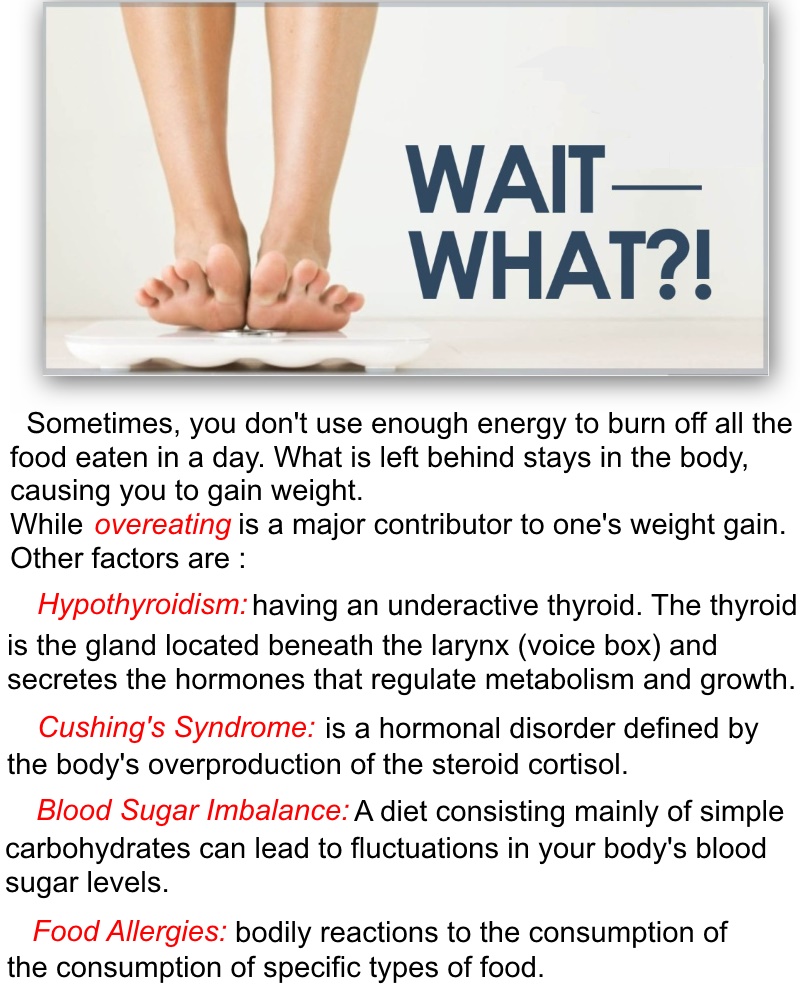what causes excessive weight gain in a woman Ways to lose belly fat & get thinner thighs
Weight gain and obesity have become increasingly common issues in our society today. There are various factors that contribute to these conditions, some of which are more obvious than others. In this article, we will explore some of the leading and hidden causes of weight gain and obesity, and provide possible solutions to address these concerns.
- Poor Diet and Nutrition:
One of the main culprits behind weight gain and obesity is a poor diet that lacks essential nutrients. Consuming high amounts of processed and junk foods, which are typically high in calories, unhealthy fats, and added sugars, can lead to weight gain over time. It is important to focus on a balanced diet that includes fresh fruits, vegetables, lean proteins, and whole grains.
 Image Source: Daily Vanguard
Image Source: Daily Vanguard
- Sedentary Lifestyle:
A sedentary lifestyle, characterized by a lack of physical activity, is another significant factor contributing to weight gain and obesity. With the rise in desk jobs, increased screen time, and less physical activity in daily routines, our bodies burn fewer calories. Engaging in regular exercise and incorporating more movement into our daily lives can help combat weight gain.
- Emotional Factors:
Emotional factors such as stress, anxiety, and depression can also contribute to weight gain. Many individuals turn to food for comfort during emotional upheavals, leading to overeating and weight gain. Developing healthy coping mechanisms, seeking support from loved ones, and practicing stress management techniques can help prevent emotional eating and subsequent weight gain.
- Lack of Sleep:
Sleep deprivation has been linked to weight gain and obesity. When we don’t get enough quality sleep, our body’s hormone levels, particularly those that regulate appetite and satiety, become disrupted. This can lead to an increase in cravings for unhealthy foods and the tendency to overeat. Ensuring adequate sleep hygiene and prioritizing quality sleep can help maintain a healthy weight.
 Image Source: Obesity Controller
Image Source: Obesity Controller
- Medications:
Certain medications, such as antidepressants, antipsychotics, corticosteroids, and hormonal contraceptives, can contribute to weight gain. If you are concerned about your weight and suspect that your medication may be a contributing factor, it is important to consult with your healthcare provider. They may be able to suggest alternative medications or provide guidance on managing weight while on the prescribed medication.
- Genetic Predisposition:
Some individuals may have a genetic predisposition to weight gain and obesity. This means that their bodies may naturally store more fat or have a slower metabolism, making it easier to gain weight. While genetics play a role, it does not mean that weight gain is inevitable. By adopting a healthy lifestyle and making conscious choices, individuals can still maintain a healthy weight.
- Environmental Factors:
Environmental factors, such as the availability and accessibility of unhealthy food options, can contribute to weight gain and obesity. Living in areas with limited access to fresh and nutritious foods can make it challenging to maintain a healthy diet. Advocating for healthier food options in communities and making informed choices when grocery shopping can help combat this issue.
- Hormonal Imbalances:
Hormonal imbalances, such as an underactive thyroid (hypothyroidism) or polycystic ovary syndrome (PCOS), can contribute to weight gain and make it difficult to lose weight. If you suspect hormonal imbalances are a factor in your weight gain, it is essential to consult with a healthcare professional who can perform the necessary tests and provide appropriate treatment options.
- Socioeconomic Factors:
Socioeconomic factors, including income level and education, can also influence weight gain and obesity. Individuals with lower incomes may have limited access to healthier food options or lack the resources to engage in physical activities. Addressing socioeconomic disparities and promoting initiatives that increase access to nutritious foods and resources for physical activity can help mitigate these effects.
In conclusion, weight gain and obesity can be attributed to multiple factors, including poor diet, sedentary lifestyle, emotional factors, lack of sleep, medications, genetic predisposition, environmental factors, hormonal imbalances, and socioeconomic factors. By understanding these causes and implementing appropriate solutions, such as proper nutrition, regular exercise, stress management techniques, and seeking medical advice when necessary, we can work towards maintaining a healthy weight and overall well-being.
If you are looking for What Causes Weight Gain - Lose Weight By Understanding The Causes ! ~ Top4You you’ve visit to the right place. We have 5 Pics about What Causes Weight Gain - Lose Weight By Understanding The Causes ! ~ Top4You like Ways to Lose Belly Fat & Get Thinner Thighs | Healthy Living, 15 Hidden Causes of Weight Gain | Power of Positivity and also Causes Of Unintentional Weight Gain | Over Weight. Read more:
What Causes Weight Gain - Lose Weight By Understanding The Causes ! ~ Top4You
 thetop4you.blogspot.comgain
thetop4you.blogspot.comgain
Causes Of Unintentional Weight Gain | Over Weight
 obesitycontroller.comunintentional
obesitycontroller.comunintentional
15 Hidden Causes Of Weight Gain | Power Of Positivity
 www.powerofpositivity.comgain
www.powerofpositivity.comgain
Ways To Lose Belly Fat & Get Thinner Thighs | Healthy Living
 healthyliving.azcentral.comthinner
healthyliving.azcentral.comthinner
9 Leading And Hidden Causes And Solutions Of Weight Gain And Obesity
 www.dailyvanguard.comgain causes weight obesity leading hidden solutions ago years
www.dailyvanguard.comgain causes weight obesity leading hidden solutions ago years
Ways to lose belly fat & get thinner thighs. Causes of unintentional weight gain. What causes weight gain